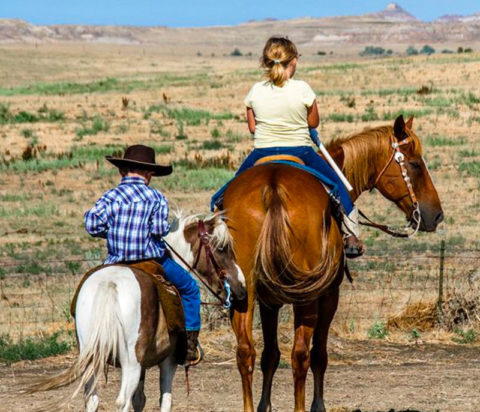Valuable Life Lessons Ranch Kids Learn for Free
Earn your Spurs

5 Valuable Life Lessons Ranch Kids Learn for Free
Last updated January 5, 2020
When I was a kid, I remember riding in the truck with my dad on the way to a horse show one night. It was late and my brother and I were tired and hungry. As inquisitive little kids will often do, I asked my dad what we would do when we finally got there. His answer, “We’ll go put the horses up at the fairgrounds. They always eat before we do.”
That lesson has always stuck with me throughout my life. It’s one I’ve never forgotten. As a responsible livestock owner, it is my job to always take my horse’s needs seriously. It is my job to ensure they have good quality feed, hoof care, teeth care, and when they are sick or hurt, they go to the vet. I might not be able to tell you the last time I went to the dentist but I darn sure know the last time my horse had his teeth floated.
Being responsible for livestock isn’t always easy (or pets for that matter). It definitely makes travel a little trickier and decreases the disposable income every month. But it is a valuable lesson in responsibility that kids who don’t grow up around animals don’t always get the chance to learn at a young age.
Instilling similar values in non-ranch kids…
Make kids responsible for the family pet (once they are mature enough to understand such responsibility). In addition to feeding, watering and making arrangements for someone else to take over for them when they won’t be home to do so, have them keep track of the dog’s annual check-up or vaccinations.
How to get the job done
On a ranch, the work is never, ever through. There is livestock to be fed, hay to be cut and baled, calves to be branded, yearlings to be shipped, fence to be fixed…the list goes on and on. “Getting the job done” is often a life or death situation, and if not life or death, it certainly impacts the operation’s bottom line.
When a kid in town quits his first paper route, nobody is going to die and the loss of income is probably not going to have a huge impact on the family. If a ranch kid doesn’t get the hay baled, the cattle aren’t going to have anything to eat, come winter. And the income generated from hay sales will be lost.
Ranch kids learn that their actions (or lack thereof) have real consequences. They have the ability to impact the entire operation at an early age. That’s where that solid work ethic comes from.
Consider a family farm in St David Arizona. Look into 4H programs in St David and Benson.
Instilling similar values in non-ranch kids…
Allow kids to experience the natural consequences of their actions. If they forget their school work at home on the day it’s due, don’t be so quick to rush it down to the school for them. And when it comes to household chores, agree to a positive consequence or negative consequence when they are assigned. Studies show that we are far more likely to do something in order to avoid a negative consequence rather than earn a positive consequence where there is no negative consequence for not completing the task.
For instance, instead of, “if you do your chores, you get an allowance,” make it “if you don’t do your chores, you don’t get to go to the football game.”
There is no such thing as failure
Most of us learn at some point in life that failure is a necessary stumbling block to learn the lessons. Personally, I don’t believe in failure. If something doesn’t work, it’s time to pivot, not throw in the towel.
You know the old saying, “if you get bucked off, just climb right back on?” Cowboys invented that one. Why? Because when you’re breaking a young horse (granted some of the modern philosophies have changed), getting back on signifies your determination to get the job done. You’re not going to let him win. You’re not going to accept failure…… And the American Quarter Horse Association (AQHA) has many members in Cochise County. Consider joining.
In ranching, you take the curve balls as they come and you make lemonade with the lemons. In other words, you pivot.
We talk a lot about try, determination, and grit on this blog and on the podcast. It’s what separates great cowboys from the not-so-greats. Ranch kids learn, “you never give up.” Failure does not exist.
Instilling similar values in non-ranch kids…
According to Angela Duckworth who studies and teaches grit, you need to give kids the opportunity to do something challenging. Whether it is gymnastics or football (the activity isn’t as important as the effort), encourage them to try something new and continue to improve gradually. Remind them that everything is hard before it becomes easy and encourage them to keep going even when things are hard. It’s all part of the journey.
Passion is more important than money
This is really an interesting one to me. It’s why many ranches are passed down from generation to generation. When kids grow up doing this work, they learn to love it. Not always. There are certainly many cases of kids who run away from the family ranch with their hair on fire.
But those who stay do it for the love of it. They do it because they have passion for the work they do. They have pride for the skills they have honed – the ability to doctor a calf in a wide-open pasture with nothing but a vet bag and a steadfast saddle horse or the art of floating a 60-foot lariat rope over the ground in the branding trap and snagging two feet.
They believe in raising their families in the same tradition as they themselves were raised.
And sometimes those kids who run away from the ranch with their hair on fire eventually return. Once they realize that money alone could never put pride in their hearts the way cool, dark mornings headed out to gather cattle on the ranch could.
Instilling similar values in non-ranch kids…
When kids take an interest in something, encourage them to keep going! So many times, we think that what our kids like isn’t going to take them anywhere, “what on earth are you going to do with an art degree?” This even happens in ranching families. Kids are sometimes encouraged to pursue other careers where they can make more money and have an easier life.
But people make the biggest impact where they have the biggest interest. And consequently, it gives their life meaning. What are your kids’ special talents and what are some areas where they might put them to use in a way that truly excites them?
The importance of family working together
Ranching has traditionally been a family operation. Grandma and Grandpa, Mom and Dad, Aunt and Uncle.
Modern-day ranches may not look exactly like this in a lot of cases. Mom might work in town to help make ends meet. And in many cases ranches are owned by corporations rather than families.
But even so, Mom is still cooking up food for the branding on the weekend and even on non-family ranches owned by massive corporations, it’s still a family operation to those who manage it.
Everyone fills an important role.
Kids learn fairly early on that they are an integral part of the ranching operation. Dad can’t gather the cattle all by himself (or in my case, he can’t work the cutting horses without turnback help), after all.
That sense of responsibility teaches self-confidence. “I am important.”
And while there will still be fights among siblings (find me a ranch kid who hasn’t roped, “hot-shotted” or shot their sibling with a bb gun), when it comes to completing an important task, like gathering, feeding, or branding cattle that can’t easily be done solo, kids learn their particular strengths and the importance of working together.
Instilling similar values in non-ranch kids…
Ranch families tend to have a lot of stories. The traditions have been passed down from generation to generation. This can be done in non-ranch families as well. By telling kids about their family history it makes them feel like they are part of something bigger than themselves.
When it comes to working together, make sure kids understand they have an important role in the family dynamic. It’s their job to fill that role responsibly.
I recently listened to a podcast episode about a large family that had a homemade wooden play-ship in their driveway and each child was assigned an important role on the ship. Even in play, the kids had responsibilities. For instance, the ship “medic” had a first aid kit with Band-Aids and tweezers for removing splinters. She was also in charge of keeping track of her siblings’ real-life doctor appointments. Remarkably, several of the twelve kids went on to have careers in a similar field to their role on the ship.
Kids who grow up on ranches are fortunate to have experiences that other kids simply don’t get to have. And the ranch and ranching way of life are there to instill values they have little choice but to learn. But the good news is, with a little extra effort and imagination, parents can still encourage ranch values, even without the ranch.
